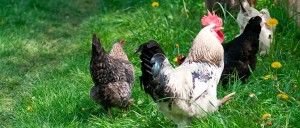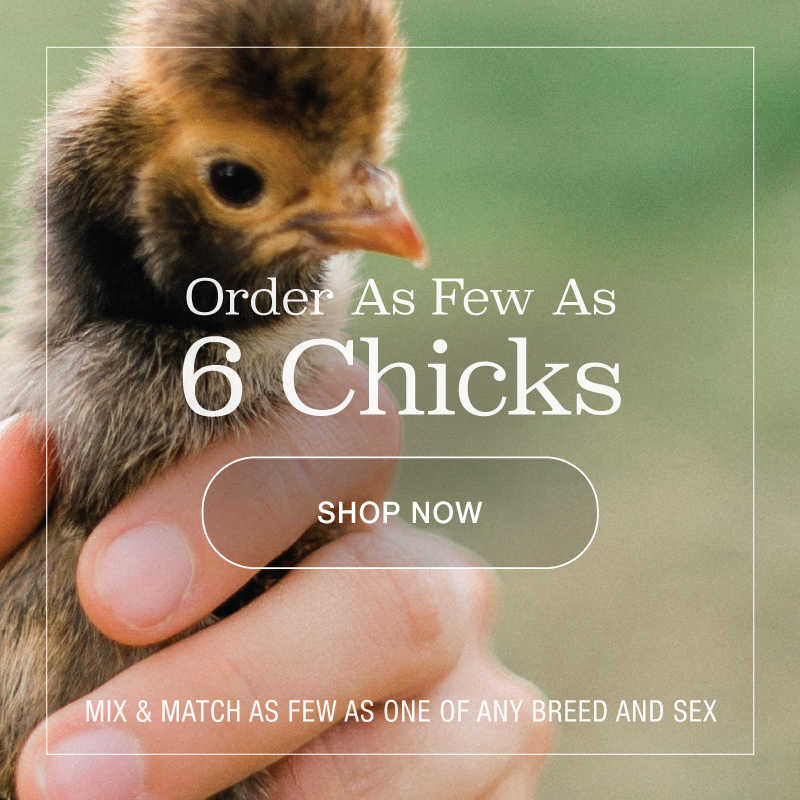 The summer heat doesn’t just take its toll on humans, it affects our feathered friends as well. It is difficult for chickens to stay cool during the summer months, so the more you can do to assist them, the better off you will all be. Chickens don’t sweat, so they rely on panting to keep cool and they also hold their wings away from their bodies to allow the air to flow under their wings. Their combs and wattles also assist with keeping their body temperatures down by allowing the heat to escape their bodies.
The summer heat doesn’t just take its toll on humans, it affects our feathered friends as well. It is difficult for chickens to stay cool during the summer months, so the more you can do to assist them, the better off you will all be. Chickens don’t sweat, so they rely on panting to keep cool and they also hold their wings away from their bodies to allow the air to flow under their wings. Their combs and wattles also assist with keeping their body temperatures down by allowing the heat to escape their bodies.
To assist you with keeping your flock cool this summer, we have compiled some tips for you to follow. In fact, some of these were submitted to us by our Facebook followers.
COLD WATER — Clean accessible drinking water for your birds is very important. During the summer heat, switch to more shallow pans to make it easy to clean and keep full. Also, consider adding a block of ice to the water to keep it colder longer. If you use nipple waterers, make sure you add pans of water around your run for easy additional access.
Adding a product that adds vitamins and electrolytes in the drinking water, such as Quik Chik will help reduce the effects of heat stress in your poultry, as well.
Providing non-drinking water for your chickens to enjoy will help keep them comfortable as it will provide them an opportunity to get their feet wet and to dunk their heads. Dunking their heads in water and cooling their wattles and combs immediately lowers their body temperature.
SHADE — If you don’t have natural shade, create some by using a small covered structure or use a tarp or umbrellas. The shaded areas will allow your chickens to gather in a cooler place out of the direct sunlight.
FEED — Chickens consume a lot less feed in the summer. Stay away from feeding scratch grains because digesting the scratch can actually warm up a chicken’s body temperature. In the extreme heat, lighting the coop and feeding the chickens at night will encourage them to eat because it is cooler.
ADDITIONAL TIPS — Frozen watermelon is treat that many of our readers shared with us that they use to hydrate and cool their chickens. Freeze ice blocks and include strawberries, blueberries, cucumber slices, and vegetables, such as, peas and corn kernels. This allows the chickens to get the additional hydration needed from the ice and nutrients from the hidden treats. One Facebook follower shared she adds mint to her ice blocks to help reduce the chickens body temperature.
Several Facebook followers shared that they hang frozen ice jugs in front of an oscillating fans to create a “mister” effect. Be careful when using this method as it could generate too much moisture which can cause respiratory issues. Also make sure the ice jugs are secure. You can also freeze milk jugs of water and set them around the run so the chickens can lean against them to cool off as one follower shared.
If you do notice that you have a chicken that is suffering from the effects of the heat, get it to a cool area, provide hydration and soak their feet in cool water to assist with bringing their body temperature down.
By paying attention to your flock and implementing some of the tips we shared above, your chickens will remain healthy and producing throughout the summer heat.



We used to feed our chickens fresh, ripe tomatoes. They consumed every part of them but especially liked the seeds and surrounding liquid. It didn’t take them very long to eat them, either!
Note: Do Not feed your hens ripe fruit whether frozen or not, all ripe fruits, melons, etc. cause the hens to stop laying and it takes approx. 6 weeks after they last eat some fruit for them to start laying again. Fruit also delays the onset of laying in pullets; I learned the hard way. I have always had Sex Link hens that I raised from baby chicks; each flock started laying as pullets at 17-19 weeks old. One year I raised lots and lots of melons in my garden; I decided the melons would be great as treats to my pullets so I started feeding the ripe ones to the chickens. At the age of 22 weeks, the pullets had not yet started to laying and I was dumbfounded – I read everything I could find on the internet and Lo and Behold I found an article from CountrySide Magazine that said ripe fruit stopped, prevented, and delayed laying. A hard lesson to learn for an ‘Old Lady that sells eggs to supplement her SS income.’
I put ice in the water as suggested by your article. I lost 6 birds to thermal shock. diagnose by vet.
Great advice.
I put out a large dog bowl of cold water and add frozen peas or blueberries.
I am getting some spotted eggs{blood I think] I open them up -one-two, small spots in side. What is this. the chicken or chickens are not young. “HELP”
I wanted to thank you for this bulletin, I never put more than an eight hour supply of water in my watering cans, and I’ve always made shade available to my chickens. I have never really thought specifically about providing some relief from the heat. I will be heading for the supermarket for some frozen peas, corn, and watermelon after work this evening so I can start freezing some blocks. I was concerned about the non drinkable trays of water to dip their feet in. In my experience the only water I’ve ever seen that a chicken will not drink, is water that has algae in it. I would be worried about having water around that the chickens would walk through, because even if it gets dirty a chicken will drink it. It is for that reason that I hang my watering troughs high enough that they can just reach in with their beaks. This year I purchase some white rocks from a farmer, and as they grew I realized some had white legs. They don’t own any white legged chickens, they own mostly barred and white rock and Australorps, so if anyone can tell me where the white legs could have come from, I’d certainly appreciate it.
very helpful, we are in South Central Texas, very hot and already follow some of these suggestions, but now have a few more to go by, Thanks!
Hi, We also use a floor fan set up next to the coop and our hens love it and will stand in front of it with wings spread. I have even seen them take turns in front of the fan.
This is great tips. Thank you so much I printed this page to use all summer.
you talk about respiratory distress. I was thinking about putting a mister in my hen house. would that be too much moisture?
Our weather in Tennessee changed suddenly with humidity and high temps. For our feathered chicks I did shallow watering pans and shallow feed over a month ago and allowed them to go to the hen house to visit with older pullets and ducks. Misted the dry feed on one end and the girls gobbled up the cool damp feed immediately. This has been a good experience but savor the hens that take care of the brood. Needless to say much easier for all. Thank you for the great healthy hatch.
I cook all scrapes from my squash and zucchini and all the overgrown ones and then freeze them inside freezer containers. Then feed these frozen veggie pops back to my chickens to help keep them cool on very hot days. I do that I also freeze milk jugs and toss them into their water containers to cool down their water. I do everything I can to keep them cool cause I know it is hot for me, it is hot for them.
Can I use parts of this for a newspaper article on summer care of birds?
Appreciate any help on this.
What great tips – my hen house has an entire wall of wire netting so they get heaps of air from the cool side too but I look forward to making them ice blocks with feed in them – what a great idea! c
These are wonderful ideas! I also wet down underneath my Girls RV Palace. They like to dirt bath under it so every morning I spritz it when cleaning up their water bowls. It wets the top layer of dirt and when they go under for the afternoon bath, they just waller to their little hearts content. I’ve also kept bales of alfalfa for them to consume. They love it, it’s healthy and the remains make a great ground cover in the summer and mulch in the winter. The ground cover gives them something to scratch at and keeps the ground moist, where they can collect bugs and also bath. By the end of the day, most of the ground is dried from the summer sun, but my girls still have a few areas they know will sustain them thru that heat. I keep my girls happy and they feed me well. Short of putting an A/C in their RV Palace, (I’ve converted an old RV to a hen house) lol, me and my flock are just one big happy family. Oh, and when August arrives here in Oklahoma, I have a little sprinkler I will turn on for a while in their shaded area which, like children, they enjoy playing under. I’ve spoiled my chicks. I guess you’ve gathered… lol
are bigest problem right now is how to keep them dang flys away we klean the heck out the coop and there still prety hevy in mass any tips please